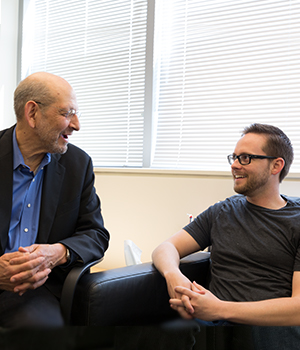
Frank Solomon
(he/him)
Biology
“Talk to Frank.”
Professor Frank Solomon is a human being who cares about and respects students. He truly listens, and he understands. For these reasons, when someone in Course 7 is having trouble, be it academic, professional, or personal, they are advised to “go talk to Frank.” One such student recalls, “That single conversation was more helpful to my professional life than any other I have ever had, and I will always consider Frank the most caring person I know at MIT.” This is because Frank’s advice is centered on what is good for the student, even if it is not the best for MIT or the department.
Frank Solomon’s caring and effective style of teaching was already recognized by his department. He was awarded a School of Science Prize for Excellence in Graduate Teaching, in 2011. What makes Frank’s impact unique is that students come to him with the big issues. When graduate students encounter difficulties that drive them to question their career decisions, they find Frank—even when he is not their advisor or mentor. One student, who, after a series of trials, was overwhelmed with anxiety and considered leaving the program, writes, “Without his help, I do not know if I would be in the better state that I am in today. I truly feel that he cares about me as a person and as a student who wants to be successful.”
Frank’s own path to academia may lend him the ability to connect and to understand. As described by Frank, that path “is most notable for its extreme bumpiness.” Frank was the first person in his family to graduate from high school. He went on to attend Harvard University, where he describes being “completely unprepared.” But once he learned to stay afloat, he “started swimming everywhere,” and graduated with a degree in history. Solomon later attended graduate school in biology, at Brandeis University, and eventually came to MIT in 1974.
His research has focused on the importance of microtubules in the maintenance of cell shape and organization of the cytoplasm, and, further, how the cell regulates their assembly and functional interactions. After serving in a variety of positions in the Biology department, including chair of the graduate committee, Frank’s focus has now turned to teaching.
Solomon believes it is very important to ask, “How are we training people, and for what?” According to Frank, graduate curricula must prepare students for a broader range of career options. The MIT community is fortunate to have such an outstanding student advocate.
